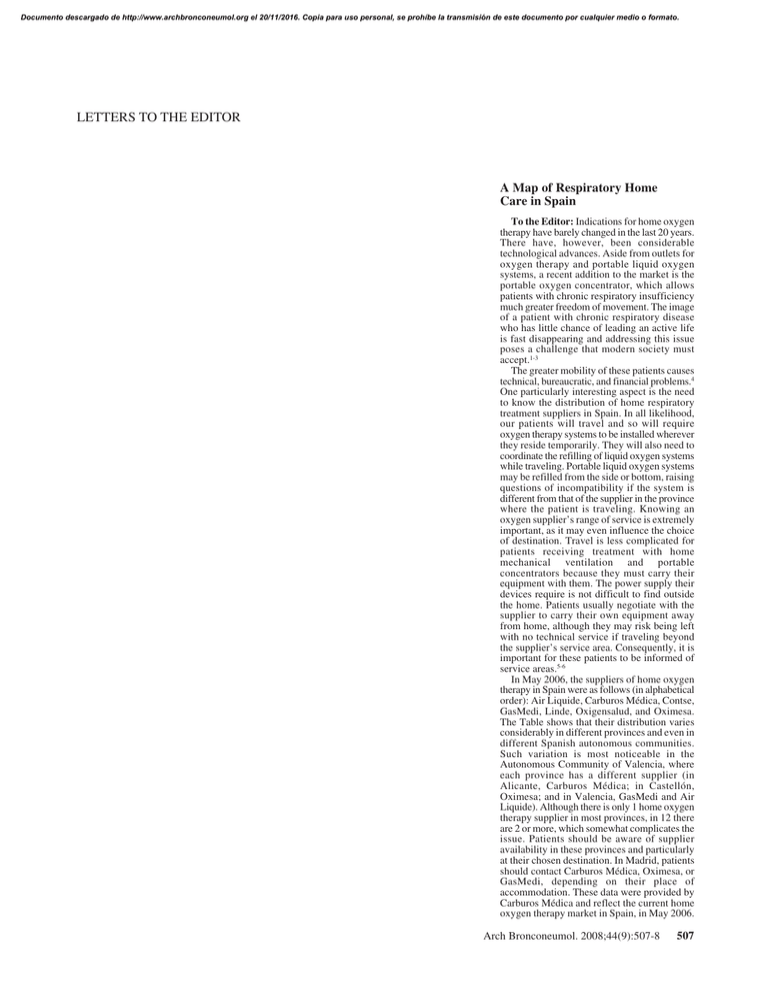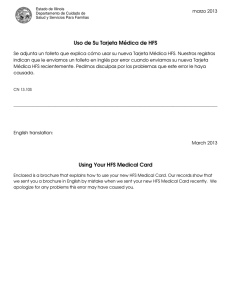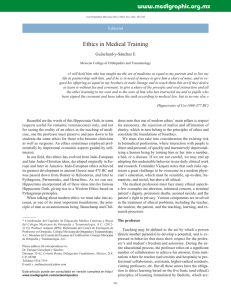LETTERS TO THE EDITOR
Anuncio

Documento descargado de http://www.archbronconeumol.org el 20/11/2016. Copia para uso personal, se prohíbe la transmisión de este documento por cualquier medio o formato. LETTERS TO THE EDITOR A Map of Respiratory Home Care in Spain To the Editor: Indications for home oxygen therapy have barely changed in the last 20 years. There have, however, been considerable technological advances. Aside from outlets for oxygen therapy and portable liquid oxygen systems, a recent addition to the market is the portable oxygen concentrator, which allows patients with chronic respiratory insufficiency much greater freedom of movement. The image of a patient with chronic respiratory disease who has little chance of leading an active life is fast disappearing and addressing this issue poses a challenge that modern society must accept.1-3 The greater mobility of these patients causes technical, bureaucratic, and financial problems.4 One particularly interesting aspect is the need to know the distribution of home respiratory treatment suppliers in Spain. In all likelihood, our patients will travel and so will require oxygen therapy systems to be installed wherever they reside temporarily. They will also need to coordinate the refilling of liquid oxygen systems while traveling. Portable liquid oxygen systems may be refilled from the side or bottom, raising questions of incompatibility if the system is different from that of the supplier in the province where the patient is traveling. Knowing an oxygen supplier’s range of service is extremely important, as it may even influence the choice of destination. Travel is less complicated for patients receiving treatment with home mechanical ventilation and portable concentrators because they must carry their equipment with them. The power supply their devices require is not difficult to find outside the home. Patients usually negotiate with the supplier to carry their own equipment away from home, although they may risk being left with no technical service if traveling beyond the supplier’s service area. Consequently, it is important for these patients to be informed of service areas.5-6 In May 2006, the suppliers of home oxygen therapy in Spain were as follows (in alphabetical order): Air Liquide, Carburos Médica, Contse, GasMedi, Linde, Oxigensalud, and Oximesa. The Table shows that their distribution varies considerably in different provinces and even in different Spanish autonomous communities. Such variation is most noticeable in the Autonomous Community of Valencia, where each province has a different supplier (in Alicante, Carburos Médica; in Castellón, Oximesa; and in Valencia, GasMedi and Air Liquide). Although there is only 1 home oxygen therapy supplier in most provinces, in 12 there are 2 or more, which somewhat complicates the issue. Patients should be aware of supplier availability in these provinces and particularly at their chosen destination. In Madrid, patients should contact Carburos Médica, Oximesa, or GasMedi, depending on their place of accommodation. These data were provided by Carburos Médica and reflect the current home oxygen therapy market in Spain, in May 2006. Arch Bronconeumol. 2008;44(9):507-8 507 Documento descargado de http://www.archbronconeumol.org el 20/11/2016. Copia para uso personal, se prohíbe la transmisión de este documento por cualquier medio o formato. LETTERS TO THE EDITOR Distribution of Home Respiratory Treatment Suppliers by Province Province Supplier A Coruña Álava Albacete Alicante Almería Province Oximesa Oximesa Oximesa Carburos Médica GasMedi (Torrecárdenas Hospital), Air Liquide (Olvera and El Ejido Hospitals) Asturias GasMedi Ávila Carburos Médica Badajoz Air Liquide Barcelona Carburos Médica, Oximesa, Contse, Air Liquide, Oxigensalud, GasMedi Burgos Oximesa Cáceres Air Liquide Cádiz Oximesa Cantabria Oximesa Castellón Oximesa Ciudad Real Carburos Médica Córdoba Linde (Hospital de Pozoblanco), Oximesa (Hospital de Cabra) Cuenca Oximesa Gerona Contse, Oxigensalud Carburos Médica Granada Oximesa Guadalajara Carburos Médica Guipúzcoa Carburos Médica Huelva Oximesa Huesca Carburos Médica Balearic Islands Carburos Médica, GasMedi Supplier Jaén La Rioja Las Palmas León Lérida Oximesa Oximesa, GasMedi Carburos Médica Carburos Médica Contse, Oxigensalud Lugo Madrid Malaga Murcia Air Liquide Carburos Médica, GasMedi, Oximesa Air Liquide, GasMedi, Oximesa Air Liquide, GasMedi, Linde Navarre Orense Palencia Pontevedra Salamanca Santa Cruz de Tenerife Segovia Seville GasMedi GasMedi Contse, Oxigensalud Oximesa GasMedi Carburos Médica (DOT) GasMedi (sleep) Carburos Médica Carburos Médica, Linde, Air Liquide Soria Tarragona Teruel Toledo Valencia Valladolid Vizcaya Zamora Zaragoza GasMedi GasMedi GasMedi Carburos Médica Air Liquide (DOT) GasMedi (sleep) Contse, Oxigensalud GasMedi GasMedi Carburos Médica Abbreviation: DOT, domiciliary oxygen therapy. A better understanding of the map of home oxygen therapy in Spain will enable us to advise patients about important aspects such as the location of the same supplier that provides service at their place of usual residence or whether, for example, they will be required to change supplier or oxygen therapy system at their holiday location. This map will become an indispensable working tool in our clinical practice. Salvador Díaz Lobatoa and Sagrario Mayoralas Alisesb a Sección de Neumología, Hospital Ramón y Cajal, Madrid, Spain b Servicio de Neumología, Hospital de Móstoles, Móstoles, Madrid, Spain 508 Arch Bronconeumol. 2008;44(9):507-8 1. Castillo D, Güell R, Casan P. Sistemas de ahorro de oxígeno. Una realidad olvidada. Arch Bronconeumol. 2007;43:40-5. 2. Puente-Maestu L. Las pruebas de marcha en la prescripción de la oxigenoterapia portátil. Arch Bronconeumol. 2005;41:591-2. 3. Morante F, Güell R, Mayos M. Eficacia de la prueba de los 6 minutos de marcha en la valoración de la oxigenoterapia de deambulación. Arch Bronconeumol. 2005;41:596-600. 4. García Río F, Borderías L, Casanova C, Celli BR, Escarrabill J, González Mangado N, et al. Patología respiratoria y vuelos en avión. Arch Bronconeumol. 2007;43:101-25. 5. Escarrabill J. El futuro de la ventilación mecánica domiciliaria: redes o contenedores. Arch Bronconeumol. 2007;43:527-9. 6. Díaz Lobato S, Mayoralas Alises S. Reflexiones para la organización y desarrollo de una unidad de ventilación mecánica no invasiva y domiciliaria. Arch Bronconeumol. 2005;41:579-83.




